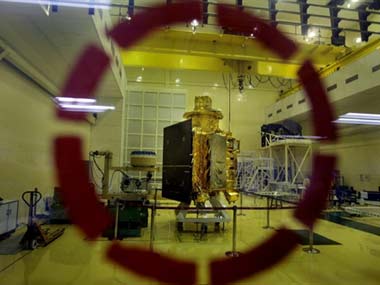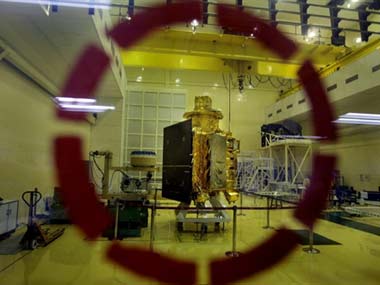By Srinivas Laxman In a major setback to India’s lunar programme, the US National Aeronautics and Space Administration (Nasa) on Tuesday offloaded this country from a joint unmanned mission to the moon designated as MoonRise. The offloading comes six months after Prime Minister Manmohan Singh and US President Barack Obama announced the strengthening of Indo-US space collaboration in a joint declaration in New Delhi in November 2010. [caption id=“attachment_16303” align=“alignleft” width=“380” caption=“File photo of the Satellite Chandrayaan-1 spacecraft, India’s first moon mission craft, at Isro. Dibyangshu Sarkar/ AFP Photo”]
 [/caption] MoonRise, as well as another Nasa mission to Venus, were rejected in favour of a flight to an asteroid called the “Origins Spectral-Interpretation-Resource-Identification-Security-Regolith-Explorer”,’ in which the Indian Space Research Organisation (Isro) is not involved. The MoonRise plan envisaged Isro partnering with Nasa’s Jet Propulsion Laboratory (JPL) which was announced by Isro chairman K Radhakrishnan in New Delhi on 12 February 2011. The tie-up was given the go-ahead by the Space Commission. At a media meet after the commission meeting, Radhakrishnan said: “We will have to send a Chandrayaan-1 like probe that will orbit the moon for about four-to-five years. The 400-500 kg satellite around the moon could carry some scientific experiments of Isro,’’ he said. He said that the proposal was an outcome of Indo-US space cooperation announced during the visit of President Obama in November 2010. India’s contribution to the MoonRise project would have been about $150 million. As a part of this lunar project, Nasa had asked Isro to build an orbiter for providing communication between the rover operating on the lunar surface and the ground stations. Isro had even initiated preliminary studies on the project, and exchange of information was in progress between Isro and JPL when the project was scrubbed on Tuesday. According to those in the know, Isro’s involvement has more than technical significance. If the project had materialised, it would have underlined a change in Indo-US security relations. Until now US labs and companies were prohibited from exchanging technologies with Isro in an attempt to limit their use for military purposes. It was a sample return mission, which means Nasa would have brought back samples from the moon for analysis. MoonRise would have focused on the giant South Pole Aitken Basin located on the far side of the moon. Though Isro officially declined to comment on the rejection, other space agency officials expressed disappointment at Nasa’s decision, calling it a serious setback to India moon dreams. They were shocked at Nasa’s decision because it has come six months after Manmohan Singh and Obama announced the strengthening of Indo-US space collaboration in a joint declaration in New Delhi. Isro and Nasa had collaborated in India’s maiden mission to the moon, Chandrayaan-1. There were two Nasa payloads on this mission, the Moon Minerology Mapper and Mini-Sar. Nasa was hoping to participate in Chandrayaan-2, too—a joint Indo-Russian venture. But, as of now Isro has no plans of including foreign participation other than Russia. The rejection by Nasa of Isro’s participation in MoonRise could not have come at a worse time for Isro because the Chandrayaan-2 flight has been delayed because of uncertainties in the rocket, the three-stage Geo Synchronous Satellite Launch Vehicle (GSLV). Originally, it was slated for liftoff in 2012. It got postponed to 2013 and is now tentatively scheduled for 2014. “Even this date is uncertain because we are having a lot of problems with the GSLV,’’ a top Isro official said.
[/caption] MoonRise, as well as another Nasa mission to Venus, were rejected in favour of a flight to an asteroid called the “Origins Spectral-Interpretation-Resource-Identification-Security-Regolith-Explorer”,’ in which the Indian Space Research Organisation (Isro) is not involved. The MoonRise plan envisaged Isro partnering with Nasa’s Jet Propulsion Laboratory (JPL) which was announced by Isro chairman K Radhakrishnan in New Delhi on 12 February 2011. The tie-up was given the go-ahead by the Space Commission. At a media meet after the commission meeting, Radhakrishnan said: “We will have to send a Chandrayaan-1 like probe that will orbit the moon for about four-to-five years. The 400-500 kg satellite around the moon could carry some scientific experiments of Isro,’’ he said. He said that the proposal was an outcome of Indo-US space cooperation announced during the visit of President Obama in November 2010. India’s contribution to the MoonRise project would have been about $150 million. As a part of this lunar project, Nasa had asked Isro to build an orbiter for providing communication between the rover operating on the lunar surface and the ground stations. Isro had even initiated preliminary studies on the project, and exchange of information was in progress between Isro and JPL when the project was scrubbed on Tuesday. According to those in the know, Isro’s involvement has more than technical significance. If the project had materialised, it would have underlined a change in Indo-US security relations. Until now US labs and companies were prohibited from exchanging technologies with Isro in an attempt to limit their use for military purposes. It was a sample return mission, which means Nasa would have brought back samples from the moon for analysis. MoonRise would have focused on the giant South Pole Aitken Basin located on the far side of the moon. Though Isro officially declined to comment on the rejection, other space agency officials expressed disappointment at Nasa’s decision, calling it a serious setback to India moon dreams. They were shocked at Nasa’s decision because it has come six months after Manmohan Singh and Obama announced the strengthening of Indo-US space collaboration in a joint declaration in New Delhi. Isro and Nasa had collaborated in India’s maiden mission to the moon, Chandrayaan-1. There were two Nasa payloads on this mission, the Moon Minerology Mapper and Mini-Sar. Nasa was hoping to participate in Chandrayaan-2, too—a joint Indo-Russian venture. But, as of now Isro has no plans of including foreign participation other than Russia. The rejection by Nasa of Isro’s participation in MoonRise could not have come at a worse time for Isro because the Chandrayaan-2 flight has been delayed because of uncertainties in the rocket, the three-stage Geo Synchronous Satellite Launch Vehicle (GSLV). Originally, it was slated for liftoff in 2012. It got postponed to 2013 and is now tentatively scheduled for 2014. “Even this date is uncertain because we are having a lot of problems with the GSLV,’’ a top Isro official said.
US abandons joint unmanned Moon Mission, Isro upset
FP Archives
• May 27, 2011, 13:31:00 IST
If the MoonRise project had taken off, it would have underlined a change in Indo-US security relations. Until now US labs and companies were prohibited from exchanging technologies with Isro in an attempt to limit their use for military purposes.
Advertisement
)